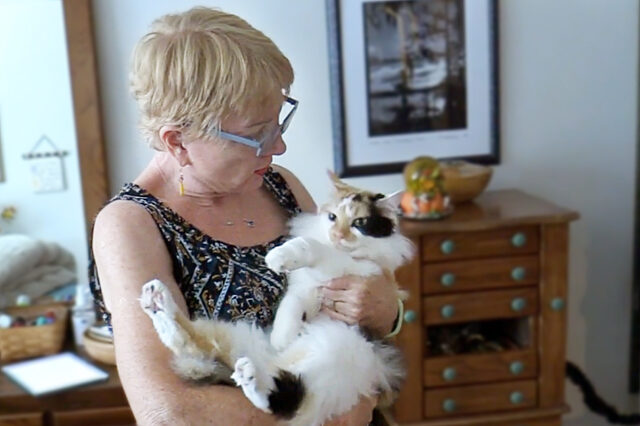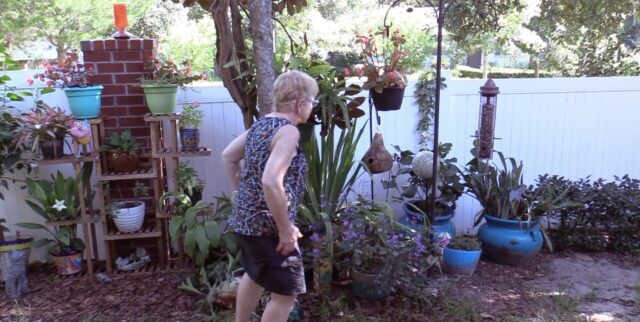Peggy’s story: Finding relief from chronic pain
A former nurse practitioner at UF Health, Peggy had severe osteoporosis and was no stranger to chronic pain. A car crash in July 2017 exacerbated her distress.

Peggy Guin is retired, but not long ago, managing her chronic pain was a full-time job. A former nurse practitioner at UF Health, Peggy had severe osteoporosis and was no stranger to chronic pain. A car
crash in July 2017 exacerbated her distress. She suffered a fracture in her lower back.
Ever since that time, I’ve had bouts of bad pain, tolerable pain, not so bad pain. There were times that I could not roll over to get out of bed to go to the bathroom first thing in the morning. I had trouble sleeping.
— Peggy
She tried everything she could think of to mitigate her pain, including medications, acupuncture, massage, physical therapy, chiropractic treatments, walking, yoga, heat/ice and various exercise programs.
Despite trying all those options, it got to the point where she knew she needed to do something different. With a background in neurology and neurosurgery, she had a deep knowledge of the evidence-based pain treatments available.
That’s when Peggy, a Gainesville resident, reached out to UF Health Pain Medicine and Rene Przkora, MD, PhD, a professor of anesthesiology and chief of the UF Division of Pain Medicine. Peggy had co-chaired a hospital committee on pain with Przkora at UF Health.
Przkora applied his individualized approach to patient care as he tested her for pain related to the facet joints, which connect the bones throughout the spine.
“We narrowed it down to my lower back pain on the left side, which was the worst,” she said.
A minimally invasive treatment
Ultimately, Peggy underwent a minimally invasive treatment called radiofrequency ablation, which involves inserting tiny needles with electrodes. The nerves supplying the facet joints are numbed and then heated by an electric current sent through the electrodes. The heating essentially “stuns” the nerves for a period of time, often several months or longer, relieving pain.
After some minor procedural discomfort, Peggy recovered quickly from the outpatient procedure, which she had under conscious sedation. She has undergone the procedure twice about a year apart and is now experiencing about 80% pain relief.
There are no limitations on your activity afterward; it’s just time, gradually getting better, and staying active.
— Peggy
It’s typical for patients to undergo the procedure multiple times, and Peggy expects she will need it again in the future. Radiofrequency ablation is not considered a cure, but rather a relatively safe option for patients who have exhausted more conservative measures such as medication and exercise. Because it does not involve implants or surgical interventions, it leaves open the possibility of those types of treatments in the future, if needed.
“Radiofrequency ablation may not last forever, but it can provide extremely meaningful relief,” Przkora said. “You can be more active; you can sleep better and enjoy more of your life. If the pain comes back as you are getting older, the procedure can be repeated.”
Resuming an active life
These days, Peggy has resumed her active lifestyle, tending to a lush collection of plants on her patio and caring for her three cats. She’s able to do many household chores, including laundry and walks every morning, with a goal of completing 5 miles.
She thanks the team at UF Health Pain Medicine and Dr. Przkora for his personalized approach. He not only listened, he also helped empower her by laying out her options.
“It’s very much a partnership,” Peggy said. “We’re very fortunate to have him and to have the clinic. I have a couple of friends that I have referred to him, and they’ve had very good results. Their comments have been, ‘My God, I wish I’d known about this sooner.’”
Often, patients battling chronic pain and back pain are unaware of the options available through UF Health Pain Medicine.
“They think there’s medicine and there’s surgery,” she said. “But there’s all kinds of other things in between.”

UF Health Pain Medicine specializes in common and complex conditions alike. We are also experts in addressing pain medicine addiction and/or fear of addiction.
About the author

